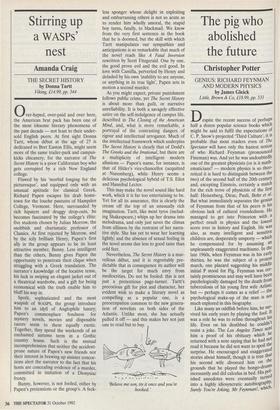Stirring up
a WASPs'
nest
Amanda Craig
THE SECRET HISTORY by Donna Tartt Viking, £14.99, pp. 544 Over-hyped, over-paid and over here, the American brat pack has been one of the most irksome literary phenomena of the past decade — not least to their under- sold English peers. At first sight Donna Tartt, whose debut at the age of 27 is dedicated to Bret Easton Ellis, might seem more of the same trailer-park and campus- kicks chicanery, for the narrator of The Secret History is a poor Californian boy who gets corrupted by a rich New England college.
Flawed by his 'morbid longing for the picturesque', and equipped only with an unusual aptitude for classical Greek, Richard Papen escapes his drab home- town for the louche pastures of Hampden College, Vermont. Here, surrounded by rich hipsters and druggy drop-outs, he becomes fascinated by the college's elite: five students chosen by Julian Morrow, the snobbish and charismatic professor of Classics. At first rejected by Morrow, and by the icily brilliant Henry, Papen's first ally in the group appears to be its least attractive member, Bunny. Less intelligent than the others, Bunny gives Papen the opportunity to penetrate their clique when struggling with a Greek translation. The narrator's knowledge of the locative tense, his luck in swiping an elegant jacket out of a theatrical wardrobe, and a gift for being economical with the truth enable him to bluff his way in.
Spoilt, sophisticated and the most waspish of WASPS, the group introduce him to an idyll of Anglophile luxury; Papen's commonplace fondness for mystery novels, movies and disposable razors seem to them equally exotic. Together, they spend the weekends of an enchanted autumn term in a Gothic country house. Such is the mutual incomprehension that neither the accident- prone nature of Papen's new friends nor i their interest in brewing up sinister concoc- tions alert the narrator to the fact that his hosts are concealing evidence of a murder, committed in imitation of a Dionysiac frenzy.
Bunny, however, is not fooled, either by Papen's pretensions or the group's. A feck-
less sponger whose delight in exploiting and embarrassing others is not so acute as to render him wholly amoral, the stupid boy turns, fatally, to blackmail. We know from the very first sentence in the book that he is doomed, but the skill with which Tartt manipulates our sympathies and anticipations is so remarkable that much of the novel reads like A Fatal Inversion rewritten by Scott Fitzgerald. One by one, the good prove evil and the evil good. In love with Camilla, perverted by Henry and deluded by his own 'inability to see anyone, or anything in its true light', Papen sets in motion a second murder.
As you might expect, private punishment follows public crime, yet The Secret History is about more than guilt, or narrative unreliability. It is both a savagely effective satire on the self-indulgence of campus life, described in The Closing of the American Mind, and, what is more remarkable, a portrayal of the contrasting dangers of rigour and intellectual arrogance. Much of the intellectual framework which underpins The Secret History is clearly that of Dodd's The Greeks and the Irrational, but there are a multiplicity of intelligent modern allusions — Papen's name, for instance, is that of Hitler's vice-chancellor (acquitted at Nuremberg), while Henry seems a delicious psychological hybrid of T.S. Eliot and Hannibal Lector.
This may make the novel sound like hard work, which it is far too entertaining to be. Yet for all its assurance, this is clearly the cream off the top of an unusually rich imagination. Tartt, like most tyros (includ- ing Shakespeare,) whips up her drama into melodrama, and only just saves the climax from silliness by the restraint of her narra- tive style. She has yet to wear her learning lightly; and the absence of sexual feeling in the novel seems due less to good taste than cold feet.
Nevertheless, The Secret History is a mar- vellous debut, and it is regrettably pre- dictable that in consequence its author will be the target for much envy from mediocrities. Do not be fooled: this is not just a pretentious page-turner. Tartt's precocious gift for plot and character, her evident wish to make a literary novel as compelling as a popular one, is a preoccupation common to the new genera- tion of novelists on both sides of the Atlantic. Unlike most, she has actually pulled it off — and this makes her not just one to read but to buy.
'Believe me son, try it once and you're hooked.'


























































 Previous page
Previous page